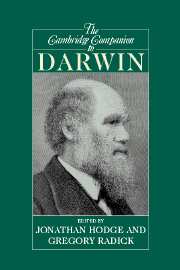17 - Giving Darwin his due
from PART IV - WAYS FORWARD
Published online by Cambridge University Press: 28 May 2006
Summary
POLAR PERSPECTIVES
Twentieth-century attempts to evaluate the philosophical significance of Darwinism have been dominated by a pair of polar perspectives. At one extreme stand those who insist on the autonomy of philosophy and who conclude, with the early Wittgenstein, that 'Darwin's theory has no more to do with philosophy than any other hypothesis in natural science.' At the other extreme are naturalists who maintain that 'now that we know' this or that other fact about the cosmos, the human brain, or (most pertinently for present purposes) the role of natural selection in hominid evolution, traditional philosophical problems are easily solved. Each opponent lives off the excesses of the other. Both also overlook the possibility that scientific ideas, including Darwin's, might play a useful, but partial, role in a variety of philosophical discussions. It has proved remarkably difficult to give Darwin his due.
Philosophers drawn to the Wittgensteinian pole typically assume that there are concepts and methods whose application to philosophical questions is unaffected by the deliverances of any science, even a science that might transform ideas about life and mind. Their discussions of questions in metaphysics, epistemology and ethics take over the idioms in which traditional philosophy has posed them, often without appreciating the fact that the language they employ was developed in response to a scientific picture that has long been superseded. Consider, for example, the group of philosophers most influenced by the younger Wittgenstein, the Vienna Circle.
- Type
- Chapter
- Information
- The Cambridge Companion to Darwin , pp. 399 - 420Publisher: Cambridge University PressPrint publication year: 2003
- 4
- Cited by

